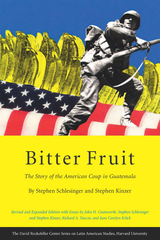

THIS EDITION HAS BEEN REPLACED BY A NEWER EDITION.
Bitter Fruit recounts in telling detail the CIA operation to overthrow the democratically elected government of Jacobo Arbenz of Guatemala in 1954. The 1982 book has become a classic, a textbook case study of Cold War meddling that succeeded only to condemn Guatemala to decades of military dictatorship. The authors make extensive use of U.S. government publications and documents, as well as interviews with former CIA and other officials. The Harvard edition includes a powerful new introduction by historian John Coatsworth, Director of the David Rockefeller Center for Latin American Studies; an insightful prologue by Richard Nuccio, former State Department official who revealed recent evidence of CIA misconduct in Guatemala to Congress; and a compelling afterword by coauthor Stephen Kinzer, now Istanbul bureau chief for the New York Times, summarizing developments that led from the 1954 coup to the peace accords that ended Guatemala's civil strife forty years later.

As the world transitions from an industrial society to an information society, agriculture has undergone a dramatic transformation. Food production in the twentieth century was transformed by three revolutions: first mechanical, then genetic, and finally chemical. Now, in the twenty-first century, agriculture is going through at least two more revolutions: an information technology revolution leading to precision farming, and a biotechnology revolution leading to genetically engineered crops.
Organized by Harvard University’s David Rockefeller Center for Latin American Studies with the collaboration of the Scientific Committee for Problems of the Environment, this interdisciplinary volume examines the impact of a variety of new technological, social, and economic trends on the rural environment.

The fifteen essays in this volume apply the methods of the new economic history to the history of the Latin American economies since 1800. The authors combine the historian's sensitivity to context and contingency with modern or "neoclassical" economic theory and quantitative methods.
The essays shed new light on the economic history of all the major economies from Mexico and Cuba to Brazil and Argentina. Some focus on comparing macroeconomic policies and performance, others analyze key sectors such as foreign trade, finance, transportation, and industry, and still others focus on the impact of property rights, government regulation, and political upheaval.

Latin America’s widespread poverty and multi-dimensioned inequalities have long perplexed and provoked observers. Until recently, economic historians could not contribute much to the discussion of living standards and inequality, because quantitative evidence for earlier eras was lacking. Since the 1990s, historians, economists, and other social scientists have sought to document and analyze the historical roots of Latin America’s relatively high inequality and persistent poverty.
This edited volume with eight compelling chapters by preeminent economists and social scientists brings together some of the most important results of this work: scholarly efforts to measure and explain changes in Latin American living standards as far back as the colonial era. The recent work has focused on physical welfare, often referred to as “biological” well-being. Much of it uses novel measures, such as data on the heights or stature of children and adults (a measure of net nutrition) and the Human Development Index (HDI). Other work brings to the discussion new and more reliable measurements that can be used for comparing countries, often with unexpected and startling results.

Latin America is a profoundly philanthropic region with deeply rooted traditions of solidarity with the less fortunate. Recently, different forms of philanthropy are emerging in the region, often involving community organization and social change.
This volume brings together groundbreaking perspectives on such diverse themes as corporate philanthropy, immigrant networks, and new grant-making and operating foundations with corporate, family, and community origins.
READERS
Browse our collection.
PUBLISHERS
See BiblioVault's publisher services.
STUDENT SERVICES
Files for college accessibility offices.
UChicago Accessibility Resources
home | accessibility | search | about | contact us
BiblioVault ® 2001 - 2024
The University of Chicago Press









